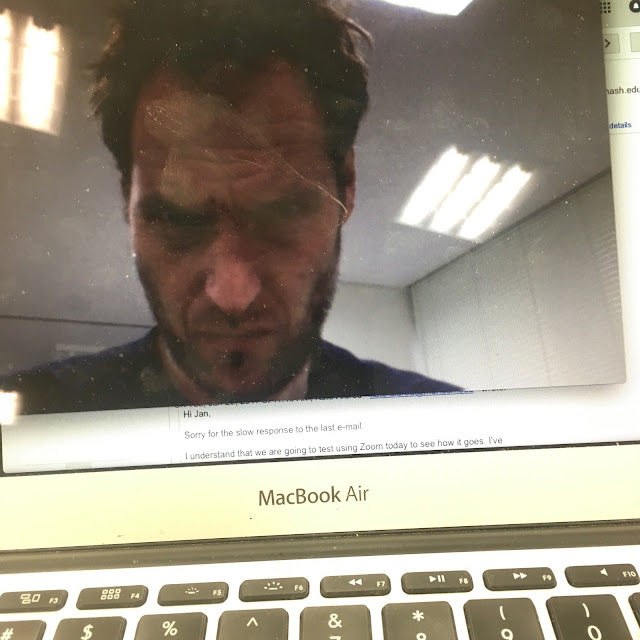On Breaking News of Death to His Laptop
in memoriam Walter Freeman, 1927 - 2016
“In agony I watch you die,”
Freeman said,
“I see your last irregular sighs,”
as he swallowed the thought
of my demise,
“observe
the spreading stains of stagnant blood
suffuse your lower…”
my lower
something.
Walter leaned on his cane,
desperately seeking the right anatomy
of melancholy,
a critical line of verse,
but “When he found his art,
he took his knife,
he slashed it,”
there was only
the true machinery of murder.
Spilling coke? Or coffee?
Or dropping me from a respectable height
onto concrete?
Somebody had ruined
Walter’s laptop, and it sobered Freeman
to realize
how much he had come to rely
on me for memories
of extraneous details.
There was little I could do,
little dying mac.
I wasn’t happy about it.
Not flippant. Not light or casual.
I wasn’t sad or flickering
or turning Microsoft.
I didn’t feel guilty about it either,
nor did I feel victimized,
neglected, underestimated,
any of that.
I didn’t feel anything, really,
in agreement with the conventional view.
But Walter Freeman,
man of brain, of genius,
attracted to turbulence,
rejected my artificial intelligence
as much as his.
In a way he was dying too,
his extraneous details gone. It was
his own fault, he feared,
having trusted me for memory.
A suicide?
Or sublimation, skipping the liquid state?
“Is time constant?”
Walter was ready to reverse
the physics, symmetrically,
me living inside him.
“What shall be our clock?
My touch accelerates your pulse.”
Dying I would not
die.
Freeman said,
“I see your last irregular sighs,”
as he swallowed the thought
of my demise,
“observe
the spreading stains of stagnant blood
suffuse your lower…”
my lower
something.
Walter leaned on his cane,
desperately seeking the right anatomy
of melancholy,
a critical line of verse,
but “When he found his art,
he took his knife,
he slashed it,”
there was only
the true machinery of murder.
Spilling coke? Or coffee?
Or dropping me from a respectable height
onto concrete?
Somebody had ruined
Walter’s laptop, and it sobered Freeman
to realize
how much he had come to rely
on me for memories
of extraneous details.
There was little I could do,
little dying mac.
I wasn’t happy about it.
Not flippant. Not light or casual.
I wasn’t sad or flickering
or turning Microsoft.
I didn’t feel guilty about it either,
nor did I feel victimized,
neglected, underestimated,
any of that.
I didn’t feel anything, really,
in agreement with the conventional view.
But Walter Freeman,
man of brain, of genius,
attracted to turbulence,
rejected my artificial intelligence
as much as his.
In a way he was dying too,
his extraneous details gone. It was
his own fault, he feared,
having trusted me for memory.
A suicide?
Or sublimation, skipping the liquid state?
“Is time constant?”
Walter was ready to reverse
the physics, symmetrically,
me living inside him.
“What shall be our clock?
My touch accelerates your pulse.”
Dying I would not
die.
